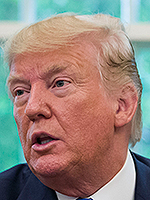Huawei Hires Trade Lobbyists as Sales Slow in US-China Fight

[Stay on top of transportation news: Get TTNews in your inbox.]
Huawei Technologies Co. hired the law firm Sidley Austin to lobby on trade as the U.S. pressures allies to join it in blacklisting the Chinese telecom giant and the company finds itself increasingly mired in President Donald Trump’s trade war with Beijing.
The lobbying, which began in July, will focus on export controls, trade sanctions “and other national security-related topics,” according to a disclosure filed with the U.S. Senate. The document shows that Huawei is deepening its ties to Sidley Austin, which already is working on the company’s legal challenges in the U.S., while also ramping up its lobbying presence.

Trump
Huawei, which is under an existential threat after the Trump administration blocked it from buying American technology over national security concerns, has been drawn into the latest escalation of the trade war.
Only six weeks ago, following a meeting in Japan with Chinese President Xi Jinping, Trump said he’d delay imposing some restrictions on U.S. companies’ sales to Huawei. The U.S. even invited companies to apply for licenses under an exemption to the Huawei ban.
But Bloomberg reported on Aug. 8 that the White House was holding off any decisions on those licenses. The delay follows a series of rapid-fire, tit-for-tat moves including Trump announcing plans to impose tariffs on $300 billion of Chinese imports in September and China halting purchases of U.S farm goods. The U.S. also declared China a currency manipulator.
Deepens Ties
Sidley Austin already is defending Huawei and a U.S. affiliate against charges that they defrauded at least four banks by concealing business dealings in Iran in violation of U.S. sanctions.

Xi
U.S. prosecutors are seeking to disqualify the company’s lead lawyer in the case, James Cole, because they say his former role as the No. 2 at the Justice Department gave him access to classified information that represents an “obvious conflict of interest.” A hearing has been scheduled in the matter in September.
Meng Wanzhou, Huawei’s chief financial officer and the daughter of its billionaire founder, Ren Zhengfei, also is charged in the case. She remains free on bail in Vancouver while she fights extradition to the U.S.
Sidley also is representing Huawei in a suit against the U.S. over seizure of telecommunications equipment during an investigation into whether the gear required export licenses. Neither Cole nor the lawyers listed in that lawsuit are among the lobbyists on the disclosure.
The Chinese company is one of the world’s biggest purchasers of semiconductors. Continuing those sales is crucial to the fortunes of chipmakers such as Intel Corp., Qualcomm Inc. and Broadcom Inc., who sent their chief executives to meet with Trump in July.
Huawei has seen a dramatic slowdown in sales growth as it deals with the U.S. campaign.
Alphabet Inc.’s Google stopped providing Huawei with a version of its Android operating system, which lets apps run and provides mobile security on smartphones. That means Huawei, the world’s second-biggest smartphone seller, can no longer pre-install Google’s popular apps, like Gmail and YouTube, on Huawei devices.
To fight back, Huawei last week unveiled an in-house operating system, called HarmonyOS, saying it can replace Android if Google’s software is barred from its future smartphones. But Ren also said the company needed a lot more time to build an apps ecosystem, a requirement for any operating software to thrive in the long run.
American Onslaught
Huawei, which the U.S. says poses a risk because it must cooperate with Beijing’s espionage agencies under Chinese law, is kicking off a yearslong overhaul to create an “iron army” that can help it survive an American onslaught while protecting its lead in next-generation wireless, Ren warned in an internal memo seen by Bloomberg News.
The U.S. says Huawei can build backdoors into its equipment and that it has stolen other companies’ intellectual property. The Shenzhen-based company counters that governments and customers in 170 countries use its equipment, which poses no greater cybersecurity threat than that of any communications technology vendor. Huawei says that the campaign results from Washington’s realization that the U.S. has fallen behind in developing fifth-generation mobile networks.
Huawei, which had all but shut down its Washington lobbying operation at the end of 2018, also has recently hired the law firms of Steptoe & Johnson and Jones Day as lobbyists. After Samir Jain, a Jones Day partner who served on President Barack Obama’s National Security Council, registered to lobby for the company, Trump criticized the move in a tweet. The company says Jain will help with legal efforts and not lobby.
Sidley Austin also represents the U.S. division of Chinese video surveillance company Hangzhou Hikvision Digital Technology Co., Alibaba Group Holding Ltd. and organizations with ties to the governments of Hong Kong and Russia, according to disclosures. It also represents Bloomberg LP, the owner of Bloomberg News.
Ian King, Jenny Leonard, Shawn Donnan, Mark Bergen and Bill Allison contributed to this report.




